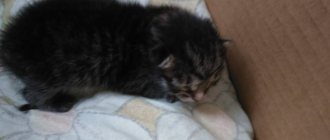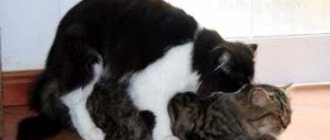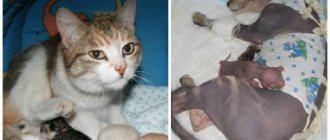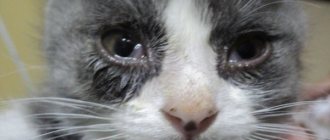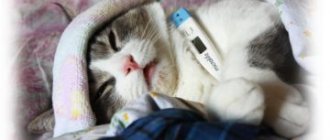Giving birth to a cat is an exciting process for the pet and its owners. The birth of one baby, contrary to the expected brood, raises concerns. Perhaps the cat did not give birth to all the kittens and surgery is necessary to remove the remaining cubs in the womb. But you should not panic if there is only one kitten in the mother's litter. In this case, all that is required from the owners is knowledge of the physiology of the pet and the ability to distinguish normality from pathology in time.
Can a cat only have one kitten?
As with other mammals, there are many factors that can affect pregnancy: age, physical health, sperm count, sperm motility and mating success are some examples. However, the number of kittens in a litter also depends on genetics. The results of fertilization are not easy to assess. Although it is rare, a female cat may only give birth to one kitten.
Another possible reason is that one or more kittens were also fertilized but did not develop properly. If the fetuses do not develop within a certain period of time, the mother cat will absorb them into her body. If they are not born but continue to develop, they will most likely be stillborn. Mother cats often eat their stillborn babies. If you did not witness the birth of the litter, the mother cat may have eaten the stillborn kitten, resulting in only one cat in the litter.
© shutterstock
Whatever the reason for having one kitten, don't worry, it doesn't in itself mean there's a health risk. Although this is not as common as in a multi-kitten litter, it is possible. You should know that pregnancy is a very delicate condition for any animal. It is very important that you set a minimum age before your cat can start breeding. Moreover, you should do your best to ensure her well-being, reassure her and always feed her well.
Signs of the end of labor
Not all and not always cat owners know what signs indicate the end of activity.
After forty minutes, the mother’s belly becomes soft.
- The first symptom is active care of the offspring. The animal diligently licks the kittens, purrs, and feeds.
- The pet breathes evenly, the pulse and heartbeat are stably rhythmic and do not go beyond physiological parameters.
- After a short time, the cat shows interest in food and drink. The pet can get up from the nest and leaves its brood for a while.
- After forty minutes, the mother’s abdomen becomes soft; palpation does not reveal any lumps.
- However, the uterus may remain in good shape for some time, which can be mistaken for a kitten.
- In this case, you should not squeeze the cat’s stomach too much; you should place both hands on the sides of the animal and carefully move along the ribs.
- It is recommended to check after the forty-minute period has expired.
- An additional sign is the cat’s calm behavior, but due to the fact that some mothers behave calmly even during childbirth, this sign is not a 100% guarantee.
Take your cat to the vet
Obviously, the best advisor is a veterinarian. They can rule out any signs of illness in your cat, run any tests if necessary, and give you some advice about feline pregnancy. However, if there are no symptoms and mother and kitten appear healthy, this is not necessary. In any case, if your cat has just given birth, you should closely monitor the health and well-being of the mother and kittens.
Although the cat may have other kittens that were consumed, it is possible that other kittens are otherwise healthy but fail to be born. Complications during a cat's birth may mean that the kittens are stuck or there are other difficulties during the birth. This is a serious situation that threatens the lives of both the future kittens and the mother cat. This will be considered a veterinary emergency and they should be taken to a veterinarian immediately.
You will be able to determine if there are any difficulties during the birth due to the behavior and symptoms of the mother cat. The time between the birth of each kitten is usually between 15 minutes and 1 hour. If your cat has not given birth to another kitten after an hour and is showing signs of distress, you will need to take her to the vet.
The mother may also experience what is called interrupted labor in cats. This is when the cat stops straining and begins to lick, nurse, and care for all the kittens that are born. Although this does not happen in most cases, it happens often enough to be considered relatively common. An interrupted labor can last up to 36 hours, although after this time it is unlikely that another kitten will be born. If a mother cat gives birth to one kitten and stops, but is fine after 24 hours or more, there is likely only one kitten in the litter.
© shutterstock
Birth of one kitten
It so happened that the first kitten was born, and there are no more offspring. You need to understand why this happened. What should you do in such a dual situation? Leave everything as is, or go to the veterinary clinic. If you look from a genetic point of view, this is possible. But this time there may be a difficult birth, and the pet is simply not able to give birth to the rest. And if you don’t catch it in time, the kittens will suffocate in the womb. Further known process, the fetus rots, resulting in blood poisoning and death.
You need to carefully monitor the cat the first day after birth and especially its behavior . If something hurts or bothers her, it is immediately noticeable. She may be hiding, or, on the contrary, she will not leave her owner’s side and meow, asking for help, or she may growl nervously.
Breeding Alternatives
You probably know that there are cat shelters in your city or country. If you're passionate about kittens or looking to expand your family, why not head to one of these places?
You should know that breeding a cat is neither easy nor practical. Although your cat may suffer from discomfort during pregnancy, millions of little kittens want to be cared for just like you.
Your cat is excited to give birth and bring new life into the world. You will see that there is a piece of fatherhood in the newborn kitten. However, there are many cats around the world who are stuck in shelters and have no home. By breeding your cat, you are unintentionally adding stress to this system and negatively impacting the welfare of all cats.
In addition, spaying your cat will benefit the cat itself by improving its health. We maintain a "don't buy" policy whenever possible.
What to do if the cat cannot give birth to the “last baby”?
When a cat has already given birth to several kittens, but there is a suspicion that not all the babies were born, urgent measures must be taken.
Attention! It is not advisable to independently check the presence of an unborn baby in a cat’s belly: it is unlikely that you will be able to feel the fetus with your fingers, but it is easy to harm it and the mother. Therefore, the only correct decision is to contact a specialist for an ultrasound.
In the absence of elevated temperature and spasms in the bronchi and heart rhythm disturbances, Oxytocin may be administered intramuscularly or into the withers to resume labor.
Sometimes the reason for the birth of small offspring should be sought in the use of hormonal drugs that prevent conception
The dosage depends on the weight of the animal, no more than 0.2-0.3 ml. If the medicine does not work, repeat the procedure after 20 minutes. If there is no result, a caesarean section can save the situation.
Important! The drug is not used if the birth canal is blocked by the fetus. The use of stimulants accelerates the separation of the placenta, which can lead to the death of the kitten and causes uterine rupture.
What signs can be used to determine the degree of readiness to conceive?
I'm ready to become a mother
First, the owner must determine how ready the cat’s body is for conception. If the animal has reached puberty and was in heat, then pregnancy may well occur.
Should know
- An increase in the sexual activity of cats is observed in the spring and summer seasons, when it is warm.
- The time when a cat begins to go into heat differs for each animal. This process lasts from 4 to 6 days. There are cases when the ability to fertilize (estrus) begins in a 4-month-old cat. Typically, when a kitten has reached 80% of her maturation weight, she is considered ready for motherhood.
- Signs of desire to mate: the animal is very affectionate, purrs, asks for more food.
- As soon as the cat comes into heat, the cat can cause inconvenience to household members: meow heavily, lift its tail up strongly, rub against the owners’ legs, ask for petting. After the animal is in heat, as a rule, a calmer period of the cat’s life begins. There was a meeting with a cat.
Not all owners know that the cat may already be pregnant.
Possible problems and solutions
The pregnancy period in cats is one of the most dangerous for the animal.
At this time, the expectant mother’s body is greatly weakened, so the likelihood of getting injured as a result of an unsuccessful jump or contracting an infection increases.
Owners who are experiencing a cat’s pregnancy for the first time may be overprotective of their pet, worry greatly about the most normal phenomena in this situation, fear for the health of the animal and constantly take it to the veterinarian.
Photo: During pregnancy, a cat’s body is vulnerable to diseases and infections
Sometimes people, wanting to provide the best care for a pregnant cat at home, overdo it, arrange luxurious spacious houses with heating pads or literally feed it with vitamins.
Very soon a miracle will happen: your cat will give birth to cute fluffy kittens! And with them, your pet and you will have new worries.
why are kittens born dead
Dead kittens
The day before yesterday our cat gave birth to 3 kittens. All dead. Why? We took the cat to the veterinarian, she examined us and said that outwardly the cat was absolutely healthy. She recommended that we bring her back in a month to get tested for toxoplasmosis and chlamydia. But we have a square! It was installed on July 14 last year, the year has not yet passed. In addition, I recently donated blood for toxoplasmosis - I didn’t even have antibodies to it. Shortly before giving birth, the cat fell from the closet - could this have led to the death of ALL the kittens? The vet said it was very unlikely.
The pregnancy lasted 67 days. On the 65th day, the cat began to actively look for a place, demand attention to itself, and brown mucus came out of it in small quantities. Fell from the closet after 2 days. 5 hours after the fall, contractions began. After she gave birth to two kittens, the contractions stopped and resumed again only 12 hours later, then she gave birth to a third.
Domestic cat, 2 years old, first birth, kittens appear to be fully formed, about 10 cm in length (if the death of the kittens was caused by an infection, would the kittens die earlier or is this possible at the very end of pregnancy?). The cat is 6 years old, also vaccinated (the last time he was vaccinated was a few days before mating - could this have had an effect?), and has successfully bred other cats many times.
I am very afraid that next time the cat may give birth to dead kittens again - this is such stress for her. Now she meows all the time that she is not held in her arms and constantly checks the place where she gave birth, although before she was quite indifferent to him - apparently she is looking for kittens ((((
What causes dead kittens to be born, maybe the cat is to blame for having weak sperm??
Many different reasons. But the wording “weak sperm” does not fit. Maybe he has diseases that can be passed on genetically to his offspring. And so along the line itself to
Source
Giving birth to a cat at home
The cat's uterus is bicornuate. The horns, at the point of their connection, pass into the uterine canal, which passes through the cervix into the vagina, and it, through the vestibule of the vagina, into the vulva - this is the birth canal. The fetuses, protected by the amniotic membrane and fixed to the wall of the uterus by the placenta, are located in the horns of the uterus.
The first stage of labor can last from 12 to 24 hours. In the initial stage it may not be noticeable. It all starts with chaotic, voluntary contractions of the uterus (pushing), breathing quickens, the cat purrs to the beat. These contractions, in the form of peristaltic waves from the top of the uterine horn to its body, are at first rare and weak, the pain is of an unclear nature.
A few hours before contractions, the vagina swells slightly, and a thick sticky discharge appears from it, transparent, yellowish or bloody in color. The animal, at this time, is restless, licks the vulva (loop), strains, as if during defecation, meows pitifully, and rake up the bedding. The uterine horns contract alternately, pushing the fetuses into the uterus.
As the labor process progresses, contractions become more frequent, their duration increases, and the pain intensifies. When the uterus contracts (contractions), the fetus is pushed towards the cervix and it dilates. At the same time, the abdominal muscles contract and the fetus moves into the vagina. The cat at this time is completely at the mercy of childbirth. A first-time cat can be extremely frightened; she screams pitifully and seeks help from her owner. While watching her, constantly talk and pet her.
During contractions, intrauterine pressure increases and the vascular membrane (chorion) ruptures. The amnion (water membrane) and allantois (urinary membrane), filled with fluid, are embedded in the cervix, expanding its canal like a hydraulic wedge. With this
Source
Animal behavior
Pregnant cats also change their behavior. From the first weeks, you can notice that expectant mothers become inactive: they will not play with you, jump, jump with the same desire, they prefer to spend more time lying down, sleeping longer.
Sometimes a cat can show anxiety: look under furniture, sniff things, meow. Try to calm her down, and the worries will pass.
Also, pets become more affectionate and sociable. They will follow the person and look for support, laying down next to you.
Photo: pregnant cats are inactive
The cat can climb onto your bed, snuggle and fall asleep, so she will feel calmer. Don't send her away. Spend time with your mother cat more often, this will help calm her down.
Pregnant pets sometimes surprise their owners with sudden changes in mood and behavior. She may be sleepy in the morning, but start running in the evening. A usually sociable cat may become quiet for a while and try not to be seen.
Don't be offended by her if she hisses at you for no apparent reason - pregnant cats are prone to mood swings. After a while, she will definitely come up with a purring apology.
In the last weeks of pregnancy, cats become heavy and can no longer jump onto their favorite chair with the same ease. Try to help them. It will be better if by this time you have already made a “nest” that will stand on the floor.
Caring for a pregnant cat
The health of the furry offspring largely depends on how its owners will care for the pregnant cat.
First of all, you should pay attention to the diet of the expectant mother. If before conception you fed your kitty dry food, then gradually switch to special food for pregnant animals
They contain much more vitamins that are so necessary for the cat during this period.
Those who are accustomed to feeding their cat from their table, that is, natural food, should consult a veterinarian about taking vitamin and mineral complexes. But you shouldn’t get carried away with them - an excess of certain substances in an animal’s body can do more harm than good and cause the development of various kinds of pathologies in kittens. Not only the menu will have to change, but also the feeding schedule. A pregnant cat should add food to its plate more often, about 5 times a day, but in smaller portions.
It is impossible to carry out anthelmintic prophylaxis and vaccinate cats in this state. These points must be taken care of before mating. As for the fight against external parasites (fleas, ticks, lice eaters), it is not only possible, but also necessary to fight them. The main thing is to use products that do not contain pesticides (for example, stronghold).
Important! If there are small children in the house, warn them that under no circumstances should a cat expecting kittens be lifted by hugging its belly and squeezed in a tight hug!
Injections for cats from pregnancy
Not all owners want to get offspring from their pet. To prevent cat pregnancy, special injections have been developed, prescribed according to a regimen selected by the veterinarian.
The injection is given before the onset of estrus, and the effect of the hormonal agent is effective for 6 months. Afterwards, a new dose of the drug will be required.
This is a kind of sterilization, simple to use, and leaving the cat the opportunity to bear offspring after the drug wears off.
This method has disadvantages: dysfunction of the reproductive system, health complications including inflammation and cancer.
